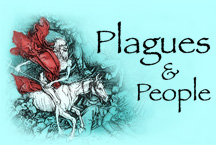
Infectious and Epidemic Disease in History
Department of History
University of California, Irvine
Instructor: Dr. Barbara J. Becker
excerpt from War of the Worlds (1897) by George Herbert Wells (1866-1946) |

Department of History
University of California, Irvine
Instructor: Dr. Barbara J. Becker
excerpt from War of the Worlds (1897) by George Herbert Wells (1866-1946) |
Dead London ...London about me gazed at me spectrally. The windows in the white houses were like the eye-sockets of skulls. About me my imagination found a thousand noiseless enemies moving. Terror seized me, a horror of my temerity. In front of me the road became pitchy black as though it was tarred, and I saw a contorted shape lying across the pathway. I could not bring myself to go on. I turned down St. John's Wood Road, and ran headlong from this unendurable stillness towards Kilburn. I hid from the night and the silence, until long after midnight, in a cabmen's shelter in Harrow Road. But before the dawn my courage returned, and while the stars were still in the sky I turned once more towards Regent's Park. I missed my way among the streets, and presently saw down a long avenue, in the half-light of the early dawn, the curve of Primrose Hill. On the summit, towering up to the fading stars, was a third Martian, erect and motionless like the others. An insane resolve possessed me. I would die and end it. And I would save myself even the trouble of killing myself. I marched on recklessly towards this Titan, and then, as I drew nearer and the light grew, I saw that a multitude of black birds was circling and clustering about the hood. At that my heart gave a bound, and I began running along the road. I hurried through the red weed that choked St. Edmund's Terrace (I waded breast-high across a torrent of water that was rushing down from the waterworks towards the Albert Road), and emerged upon the grass before the rising of the sun. Great mounds had been heaped about the crest of the hill, making a huge redoubt of it -- it was the final and largest place the Martians had made -- and from behind these heaps there rose a thin smoke against the sky. Against the sky-line an eager dog ran and disappeared. The thought that had flashed into my mind grew real, grew credible. I felt no fear, only a wild, trembling exultation, as I ran up the hill towards the motionless monster. Out of the hood hung lank shreds of brown, at which the hungry birds pecked and tore. In another moment I had scrambled up the earthen rampart and stood upon its crest, and the interior of the redoubt was below me. A mighty space it was, with gigantic machines here and there within it, huge mounds of material and strange shelter-places. And scattered about it, some in their overturned war-machines, some in the now rigid handling-machines, and a dozen of them stark and silent and laid in a row, were the Martians -- dead! -- slain as the red weed was being slain; slain, after all man's devices had failed, by the humblest things that God, in his wisdom, has put upon this earth. For so it had come about, as indeed I and many men might have foreseen had not terror and disaster blinded our minds. These germs of disease have taken toll of humanity since the beginning of things -- taken toll of our prehuman ancestors since life began here. But by virtue of this natural selection of our kind we have developed resisting power; to no germs do we succumb without a struggle, and to many -- those that cause putrefaction in dead matter, for instance -- our living frames are altogether immune. But there are no bacteria in Mars, and directly these invaders arrived, directly they drank and fed, our microscopic allies began to work their overthrow. Already when I watched them they were irrevocably doomed, dying and rotting even as they went to and fro. It was inevitable. By the toll of a billion deaths man has bought his birthright of the earth, and it is his against all comers; it would still be his were the Martians ten times as mighty as they are. For neither do men live nor die in vain. |
 |
| Go to: |
|
|